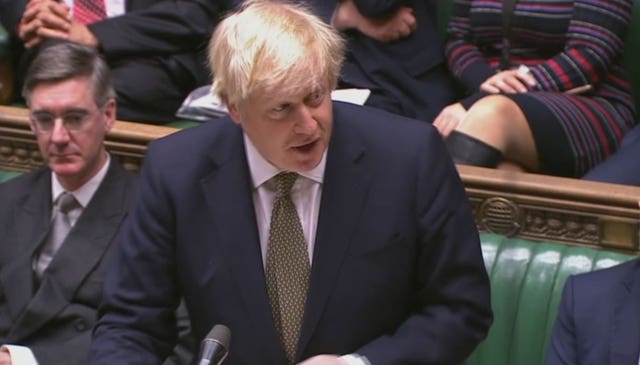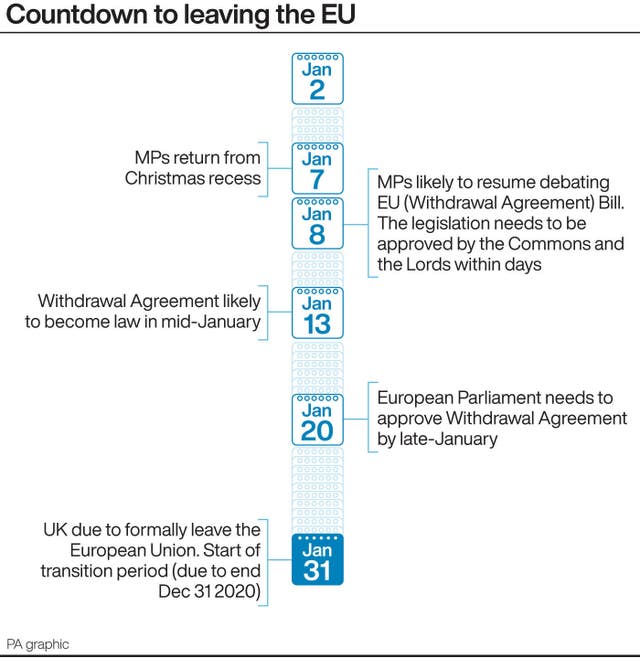A fresh attempt to avoid a no-deal Brexit at the end of 2020 will be made by Labour when key legislation returns to the Commons.
The Opposition wants the Government to seek from mid-June a two-year extension to the implementation period, which runs out at the end of December, unless certain conditions are met.
Such talks for an extension would not be required if an agreement on the future trade relationship has been concluded or the Commons has passed a motion approving the Government’s intention not to apply for an extension, with the House of Lords also considering this matter.
READ MORE: Sturgeon MP admits chance of Indyref2 this year is probably ‘nil’
An explanatory statement on the proposal reads: “This new clause would restore the role for Parliament in deciding whether to extend transition to avoid a WTO (World Trade Organisation) Brexit.”
Prime Minister Boris Johnson has insisted he believes a trade deal with the EU can be agreed before the transition period expires.
But critics fear the 11-month timetable is too tight and could lead to Brexit without a UK-EU trade deal in place.
Labour’s amendment, tabled in the name of outgoing leader Jeremy Corbyn, states: “A minister of the Crown must seek to secure agreement in the joint committee to a single decision to extend the implementation period by two years, in accordance with Article 132 of the Withdrawal Agreement unless one or more condition in subsection (2) is met.
“Those conditions are: (a) it is before 15 June 2020; (b) an agreement on the future trade relationship has been concluded; (c) the House of Commons has passed a motion in the form set out in subsection (3) and the House of Lords has considered a motion to take note of the Government’s intention not to request an extension.”
 Critics fear Boris Johnson’s timetable for a trade agreement is too tight (PA)
Critics fear Boris Johnson’s timetable for a trade agreement is too tight (PA)
It adds a minister must move a motion in the Commons for a shorter extension to the implementation period if EU representatives on the joint committee dealing with Brexit indicate they would agree to such an arrangement rather than a two-year extension.
The ratification of a trade agreement would also enable the UK to seek to end any extended transition period early, the amendment states.
It has been tabled to the European Union (Withdrawal Agreement) Bill along with a series of other proposals from opposition parties.
But they are all unlikely to make progress given Mr Johnson’s 80-seat majority secured at last month’s election.
This enabled the Bill to cruise through second reading by 358 votes to 234, majority 124, and the PM has repeatedly insisted all his MPs have pledged to support his Brexit deal and get it agreed by January 31.
 The Brexit Bill returns to the Commons, left, next Tuesday (Dominic Lipinski/PA)
The Brexit Bill returns to the Commons, left, next Tuesday (Dominic Lipinski/PA)
Mr Johnson was not so clear during the election campaign about how long the pledge runs for and whether it includes the second phase of talks, including on trade.
Other amendments tabled by Labour include a bid to protect the right for unaccompanied child refugees to be reunited with their family after Brexit.
The revised wording of the Bill removed a Government commitment to strike a deal with the European Union so child refugees can be reunited with their family in the UK, even after free movement ends.
This led to the Government being accused of reneging on the so-called “Dubs amendment” allowing greater flexibility in such matters.
READ MORE: Scottish food maker warns Brexit uncertainty is ‘significant concern’
The previous terms, pushed for by Lord Alf Dubs – who fled the Nazis as a boy – had been accepted by Theresa May when she was in Number 10, but her successor Mr Johnson has been accused of watering down the commitment to simply requiring a minister to “make a statement” to Parliament.
 (PA Graphics)
(PA Graphics)
On Northern Ireland, a Labour amendment seeks to require the Government to deliver “full transparency on the implications of the Ireland/Northern Ireland Protocol including barriers to trade between Great Britain and Northern Ireland”.
The DUP, which propped up Mrs May’s minority government under a confidence and supply agreement, has also put forward amendments protecting the access of goods.
The Bill returns to the Commons for committee stage, where these amendments could be considered, on January 7 and is expected to clear all stages in the House by January 9.
It will then proceed to the House of Lords for further scrutiny.



Why are you making commenting on The Herald only available to subscribers?
It should have been a safe space for informed debate, somewhere for readers to discuss issues around the biggest stories of the day, but all too often the below the line comments on most websites have become bogged down by off-topic discussions and abuse.
heraldscotland.com is tackling this problem by allowing only subscribers to comment.
We are doing this to improve the experience for our loyal readers and we believe it will reduce the ability of trolls and troublemakers, who occasionally find their way onto our site, to abuse our journalists and readers. We also hope it will help the comments section fulfil its promise as a part of Scotland's conversation with itself.
We are lucky at The Herald. We are read by an informed, educated readership who can add their knowledge and insights to our stories.
That is invaluable.
We are making the subscriber-only change to support our valued readers, who tell us they don't want the site cluttered up with irrelevant comments, untruths and abuse.
In the past, the journalist’s job was to collect and distribute information to the audience. Technology means that readers can shape a discussion. We look forward to hearing from you on heraldscotland.com
Comments & Moderation
Readers’ comments: You are personally liable for the content of any comments you upload to this website, so please act responsibly. We do not pre-moderate or monitor readers’ comments appearing on our websites, but we do post-moderate in response to complaints we receive or otherwise when a potential problem comes to our attention. You can make a complaint by using the ‘report this post’ link . We may then apply our discretion under the user terms to amend or delete comments.
Post moderation is undertaken full-time 9am-6pm on weekdays, and on a part-time basis outwith those hours.
Read the rules hereLast Updated:
Report this comment Cancel